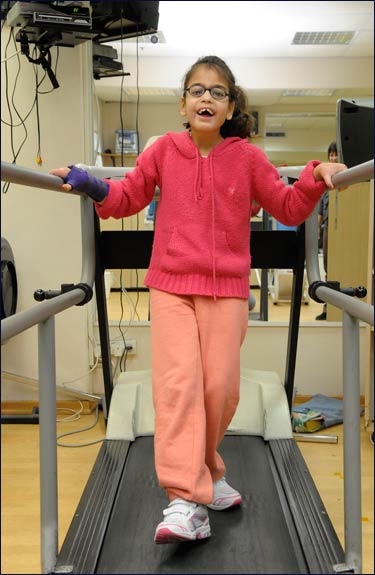By Avigayil Kadesh
Ra’anana-based nonprofit Beit Issie Shapiro (BIS) won special consultative status in 2012 from the United Nations’ Economic and Social Council (ECOSOC) -- one of only 12 Israeli organizations to receive this standing — earning Executive Director Jean Judes a chance to share “the best of what Israel has to offer the world" at the fifth session of UN Enable, a conference on the rights of the disabled.
Slots at the September 2012 meeting were also reserved for the Israeli organizations Bizchut, the Israeli Human Rights Center for People with Disabilities; and Netzivut, the Commission for Rights of Persons with Disabilities.
“The UN is often criticized for anti-Israel bias, but the issue of disabilities brings strange bedfellows into coalitions,” says Judes. “For instance, we work intensively in the Israeli Arab community and have been asked by parents and professionals there for our help. We believe all children with a disability, no matter where they live, have a right to services and to be part of a community.”

Beit Issie Shapiro provides services such as physical
therapy for 7,000 Israelis with disabilities every year. An estimated 15 percent of the world’s population lives with significant disabilities.
BIS will assist ECOSOC in serving as the central forum for formulating economic and social policy recommendations to the UN and member states concerning people with disabilities.
“This is an opportunity for us to influence policy in order to bring about a greater quality of life for these individuals and families," says Judes. “We want to change the world for people with disabilities.”
Blazing a trail
Hydrotherapy, multisensory rooms and inclusive playgrounds are among the special-needs services BIS has implemented in Israel over the past 32 years that have become a model beyond Israel's borders.
“From the beginning, our vision has been to have as wide an impact as possible in Israel and abroad, not by opening branches but by being a center of excellence for innovative practices and disseminating our knowledge, as well as influencing government policy and legislation,” Judes says.
BIS depends on what Judes calls “social investors” rather than on government funding. “We are like an R&D facility,” she says.
One happy result of that research and development was Friendship Park (Park Chaverim), Israel’s first accessible and inclusive playground.
Opened in 2005, this nine-acre area within Ra'anana City Park offers play equipment designed for children in wheelchairs and with hearing and vision impairments.
Because families with special-needs children often avoid playgrounds where their kids might experience social exclusion, Friendship Park was intended to host municipal educational activities and festivals for children and families to foster friendship and inclusivity, says BIS occupational therapist Michele Shapiro. And the concept has since been copied by other Israeli municipalities and far-away countries, including Ecuador and Uruguay.
Swimming toward better health
Long before most people had ever heard of hydrotherapy – physical therapy performed in a special heated pool -- BIS sent staff members to the United States and England to study this emerging field. As a result, BIS established Israel’s first hydrotherapy center in 1992 and influenced the government to cover hydrotherapy under national health insurance.
Israel is now recognized as one of six leading countries in the development of hydrotherapy and boasts about 120 hydrotherapy pools.
“That is the story of Israel, which is so inspiring,” says Judes.
The BIS training center for hydrotherapists served as a model for similar educational programs in Israel, and the organization trained hydrotherapists in Portugal, Spain and the United States. Recently, Uzbekistan requested training, says Judes.
Around the same time, BIS sent Shapiro to Holland to learn about Snoezelen, a controlled multisensory stimulation environment. There it was used recreationally, but Shapiro reinvented it for Israel as a therapeutic approach.
“We saw it helped our clients by balancing the senses. Hyperactive children calmed down, while passive kids became more interested in their environment. But to leverage it in a broad way, we had to have research because no one would be prepared to take the idea further if we couldn’t prove what it does.”
In cooperation with the Hebrew University of Jerusalem, BIS carried out the world’s first study on therapeutic Snoezelen.
Beit Issie Shapiro opened Israel’s first Snoezelen multisensory stimulation rooms and has helped set up 400 more in Israeli institutions.
“We have seen that it works not only for children with developmental disabilities, but also for adults with Alzheimer’s, children going through cancer treatment and trauma victims. We’re now doing research with Schneider [Children’s Medical Center of Israel] on using Snoezelen to calm cystic fibrosis patients during treatment,” says Judes.
BIS has granted many requests to present the research results in foreign countries, to help set up about 400 Snoezelen rooms in Israel, and to train more than 1,000 therapists to run them. They’ve also provided training in the US, South Africa and Europe.
Shapiro incorporated elements of Snoezelen in the BIS dental clinic to lower anxiety – a successful experiment and a world first. The University of Southern California’s schools of dentistry and occupational therapy appointed BIS as a consultant to replicate the research with a grant from the US National Institutes of Health.
In 2010, at the suggestion of a donor, 60 VIPs came with Start-Up Nation co-author Dan Senor to see how BIS effects social change for the special-needs population. “Our donor said, ‘We want all this knowledge in our own communities, to triple the impact of our dollars.’ And that was a push for us to think more globally,” says Judes. “The connection to the UN was the natural next step for us."